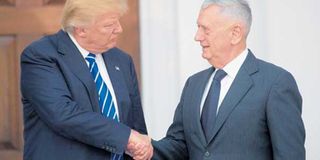OPINION: The US is losing the ability to defend itself

US President Donald Trump shaking hands with his secretary of defense James Mattis. PHOTO | FILE
Great powers die more often by suicide than murder. Political paralysis and short-term thinking robs them of the ability to keep interests and commitments in balance, to innovate militarily and economically, and to maintain their competitive edge.
See the history of the Roman Empire, the Habsburg Empire, the Ottoman Empire, the Romanov dynasty, the various Chinese dynasties, and too many others to count. Is the United States the next great power slated to suffer this melancholy fate?
That was the question on my mind as I read a blockbuster report from that rare blue-ribbon panel that has something significant and compelling to say - and manages to say it in a way that even non experts can understand.
The United States’ National Defense Strategy Commission, led by the US former undersecretary of defense Eric Edelman and retired Adm. Gary Roughead, was tasked by Congress to review the United States’ defense posture to determine whether it will keep us safe.
The answer is a resounding and alarming no. The commission writes that “America has reached the point of a full-blown national security crisis.”
“If the United States had to fight Russia in a Baltic contingency or China in a war over Taiwan, Americans could face a decisive military defeat,” the report warns. “These two nations possess precision-strike capabilities, integrated air defenses, cruise and ballistic missiles, advanced cyberwarfare and anti-satellite capabilities, significant air and naval forces, and nuclear weapons - a suite of advanced capabilities heretofore possessed only by the United States.”
Even if the United States were able to prevail, it would face “harder fights and greater losses than at any time in decades.” Air superiority, which the United States has taken for granted since World War II, is no longer assured. And, without control of the skies, US ships and soldiers would be vulnerable in ways that are difficult to imagine.
Hard-put to win
How did we get to the point where the United States would be hard-put to win even one major war - much less the two that it had planned to fight simultaneously during the Cold War? The commission pins the blame on the partisan gridlock which, starting in 2011, produced the sequestration process that automatically reduced the defense budget to cut the deficit.
The commission’s report says that, in constant 2018 dollars, US defense spending fell from $794 billion in fiscal year 2010 to $586 billion in 2015 - “the fastest drawdown since the years following the Korean War.” The result is that, by 2017, “all of the military services were at or near post-World War II lows in terms of end-strength, and all were confronting severe readiness crises and enormous deferred modernisation costs.”
The Republican-controlled Congress, with President Trump’s support, provided a temporary boost by raising defense spending this year to $716 billion.
But Trump is already tweeting about his desire to cut defense spending, with the White House suggesting that the defense budget will be reduced to $700 billion next year. If that were to happen, it would make it impossible to fund the ambitious modernisation programme called for by the Defense Strategy Commission. So we’re in deep trouble.
We are losing the military edge that has underpinned our security and prosperity since 1945. And we have no one to blame but ourselves. Political paralysis and partisanship are sabotaging American power.




